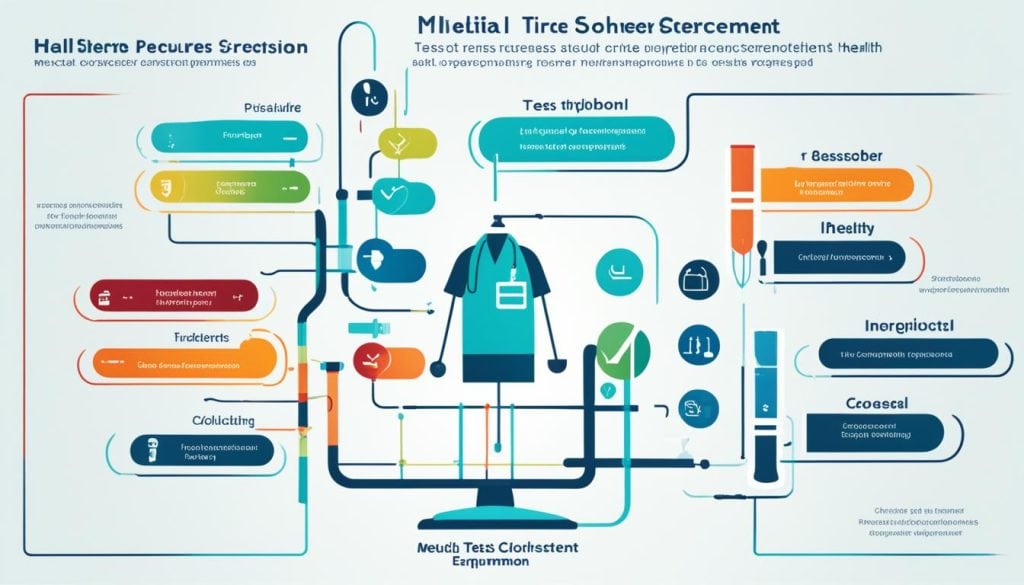Health screenings for jobs are pivotal for safeguarding workplace safety and enhancing employee well-being. Our comprehensive guide to health screenings elaborates on the integral role these evaluations play in the employment sector. We’re committed to detailing the significance of pre-employment physicals and the overall contributions of health assessments to a robust workforce. Ahead, we’ll present the essential insights and practical steps for employers and job seekers to navigate and implement these critical measures effectively.
Key Takeaways
- Health screenings act as a frontline measure to maintain workplace safety and employee health.
- Pre-employment physicals are essential for assessing the physical capabilities of prospective employees.
- A thorough understanding of health screening processes can facilitate a smooth hiring experience.
- Legal guidelines, especially the Americans with Disabilities Act (ADA), govern the administration of health screenings.
- Industry-specific health screenings ensure job suitability and regulatory compliance.
- Preparation by job seekers can significantly streamline the health screening process.
The Importance of Health Screenings in the Hiring Process
The role of health screenings in the hiring process is paramount for securing workplace safety and enhancing employee well-being. Such screenings serve as a proactive step in safeguarding not only the individual employee but also the collective workplace environment. Employers recognize that robust health protocols contribute significantly to job performance and overall productivity.
To underscore the necessity of these health assessments, consider their impact on the dynamic between job performance and health. When an employee is in optimal health, they are more apt to fulfill job duties effectively and efficiently. Moreover, the preventative nature of health screenings can detect potential health concerns early on, forestalling complications that might impair productivity and necessitate absenteeism.
Understanding that the workplace safety is intrinsically linked to an employee’s health status, employers can appreciate the value of health screenings. This assessment is not merely about compliance but about embodying a culture of caring and preventative health management. By embedding health screenings into the hiring process, businesses are laying the groundwork for a more resilient and attentive workforce.
- Workplace Safety: A proactive approach to preventing workplace incidents and injuries.
- Job Performance: Ensuring candidates are fit to perform their roles at peak capacity.
- Employee Well-being: Monitoring the health status and promoting the holistic well-being of the workforce.
Moreover, by promoting thorough health screenings, companies signal to current and prospective employees that their health is a top priority—bolstering morale and fostering a sense of loyalty. Such initiatives establish a framework of trust and accountability, fundamental to productive employer-employee relationships. The advantages on offer here include not just an abatement in health-related interruptions but also the long-term retention of a hearty and dedicated team.
| Screening Aspect | Workplace Impact | Benefits for Employees |
|---|---|---|
| Vision and Hearing Tests | Reduces risk of accidents due to sensory impairments. | Early identification and management of potential sensory issues. |
| Musculoskeletal Assessments | Ensures physical job requirements are met, limiting injury. | Prevents chronic pain by ensuring ergonomic practices. |
| Mental Health Evaluations | Creates a supportive environment contributing to mental wellness. | Stresses the importance of mental health as part of overall well-being. |
| Drug Screening | Ensures safety and compliance with legal and company policies. | Provides a clear expectation of workplace standards. |
The hiring process is an opportune moment for employers to integrate holistic health considerations into their operational strategies. Whether it’s through initial screenings or ongoing health programs, the emphasis on health is a key determinant in fostering an environment where safety, performance, and well-being are inextricably intertwined.
Health Screenings for Jobs: What Employers and Candidates Need to Know
Understanding pre-employment physicals and health screenings is essential for both employers and job candidates. This knowledge not only helps maintain workplace safety but also ensures compliance with various legal requirements. Here, we discuss how these screenings impact workforce safety, the legal backdrop provided by the ADA, and outline the key components and requirements of health assessments across different industries.

Pre-Employment Physicals and Their Role in Workforce Safety
Pre-employment physical exams are imperative in confirming an applicant’s ability to perform job-related physical tasks effectively and without risking work-related injuries. This evaluative process is a proactive step towards ensuring employee safety and mitigating workplace hazards.
Legal Considerations: The Americans with Disabilities Act (ADA) and Health Screenings
The ADA and health screenings must be carefully aligned to respect legal boundaries, particularly concerning disability-related questions. Employers are required to conduct medical examinations post a conditional job offer to ensure legal compliance and equitable treatment.
Components of a Thorough Pre-Employment Health Assessment
A robust pre-employment health assessment typically includes checks like vital signs, vision and hearing tests, mental health evaluations, musculoskeletal examinations, and drug screening. These components ascertain the physical condition of potential employees, pertinent to their job functions.
Industry-Specific Health Screening Requirements
Industry-specific health screenings serve the purpose of regulatory compliance and address unique occupational risks. Fields such as transportation, public safety, aviation, and healthcare often have distinct protocols, tailored for roles like commercial drivers, law enforcement, aviation professionals, firefighters, and healthcare workers.
Preparing for a Health Screening: What Job Applicants Should Bring
Applicants should come to their health screenings prepared with all necessary documentation, including personal identification, any prescriptions they may have, a detailed health history, and employer information to ensure a comprehensive review of their health related to the job at hand.
| Industry | Requirement | Purpose |
|---|---|---|
| Transportation (Commercial Drivers) | Department of Transportation Physical | To ensure the ability to drive safely |
| Law Enforcement | Fitness and agility tests | To confirm physical readiness for duty |
| Aviation | Federal Aviation Administration Medical Certificate | To determine fitness for flying responsibilities |
| Firefighting | Medical exam, including respiratory evaluations | To assess capability to perform under physically strenuous conditions |
| Healthcare | Infection control screenings, immunity status | To protect patients and comply with health standards |
Comprehensive Employee Health Screening Programs and Their Benefits
Integrating employee health screening programs into the corporate framework is a strategic move that benefits employers and employees alike. By prioritizing employee well-being, companies can experience a significant reduction in healthcare costs, thus creating a more sustainable and productive work environment. The advantages of these screenings are manifold and directly correlate with improved employee satisfaction and retention rates.
One of the primary benefits of comprehensive screenings is the early detection of potential health concerns which can be addressed before escalating into more serious conditions. This proactive approach not only safeguards the health and safety of employees but also minimizes the potential financial impact on both the individual and the organization.

A methodical employee health screening program is an embodiment of an employer’s commitment to maintaining a healthy workforce. The following table illustrates the varied benefits associated with comprehensive health screening initiatives:
| Benefit | Description | Impact |
|---|---|---|
| Enhanced Employee Well-being | Screenings contribute to overall health awareness and prevention of diseases among employees. | Individual health improvements and enhanced workplace morale. |
| Early Detection of Illness | Identifying signs of illness before they progress can lead to early intervention and treatment. | A decrease in absenteeism and long-term health complications. |
| Reduction in Healthcare Costs | Preventative care and early diagnosis mean reduced spending on treatments and hospitalizations. | Lower insurance premiums and reduced costs for both employer and employees. |
| Productivity Boost | Healthier employees are more efficient and less likely to take medical leaves. | Increased output and a stronger bottom line for the company. |
In conclusion, establishing employee health screening programs symbolizes a company’s investment in its most valuable asset—its people. The resulting reduction in healthcare costs, combined with the promotion of a robust culture of employee well-being, delineates a clear competitive edge for organizations that prioritize health as a core value.
Implementing Effective Health Screening Protocols for Job Applicants
In the realm of talent acquisition, the importance of developing effective health screening protocols cannot be overstressed. To maintain a robust and health-conscious workforce, it’s essential that employers craft procedures that are both meticulous and empathetic towards job applicants. This necessitates a dual focus on the minute details of screening procedures and the overarching need for communication with candidates, all the while safeguarding sensitive information.
Integral to this process is a transparent outline of job applicant protocols. Employers must ensure that candidates are fully briefed on what the health screening entails, what is expected of them, and how their data will be handled. Clear guidelines not only streamline the process but also help to alleviate applicant anxieties, fostering a climate of trust and professionalism. Furthermore, by providing a comprehensive breakdown of the steps involved, organizations can minimize uncertainties and facilitate a timely and orderly completion of health assessments.
Moreover, it is the responsibility of organizations to guarantee the confidentiality and privacy of job applicants throughout the screening journey. With an emphasis on effective communication strategies, firms can achieve a fine balance between obtaining necessary health information and respecting the privacy concerns of candidates. By doing so, they lay the groundwork for respectful and mutually beneficial relationships that begin well before the official start of employment, positioning themselves as employers of choice in the competitive job market.

